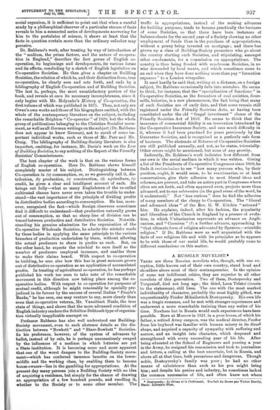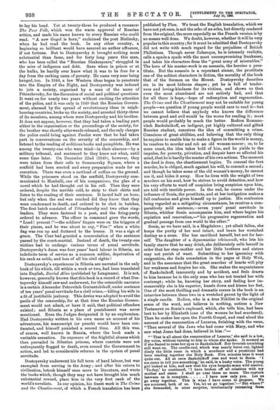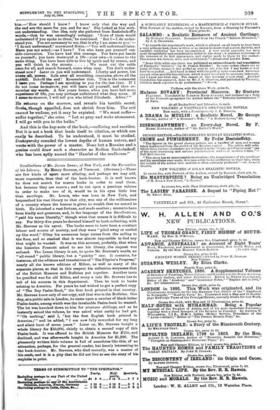A RUSSIAN NOVELIST.*
THERE are three Russian novelists who, though, with one ex- ception, little known out of their own country, stand head and shoulders above most of their contemporaries. In the opinion of some not indifferent critics, they are superior to all other novelists of this generation. Two of them, Dostoyevsky and Turgenieff, died not long ago ; the third, Leon Tolstoi (cousin to the statesman), still lives. The one with the most marked individuality of character, probably the most highly gifted, was unquestionably Feodor Mikailovitch Dostoyevsky. His own life was a tragic romance, and be met with stranger experiences and underwent a more remarkable training than any writer of his time. Nowhere but in Russia would such experiences have been possible. Born at Moscow in 1821, in a poor-house, of which his father, a retired Army surgeon, was the medical director, Feodor from his boyhood was familiar with human misery in its direst shape, and acquired a capacity of sympathy with suffering and sorrow, and an insight into character, which deepened and strengthened with every succeeding year of his life. After being educated at the School of Engineers and passing a year in the Army, he resigned his commission and took to journalism and letters, a calling at the best uncertain, but in Russia, and above all at that time, both precarious and dangerous. Though noble, Dostoyevsky's family was poor ; he had no other means of subsistence than such as his pen might bring him; and despite his genius and industry, he sometimes lacked the common necessaries of life, and often knew not where • Doetatievsleu : Le Crime et le Chdtiment. Trainit du RUBIO per Victor thirdly. Paris: Librairie Mu. to lay his head. Yet at twenty-three he produced a romance' The Poor Folk, which won the warm approval of Russian critics, and made his name known to every Russian who could read. "A new Gogol is born," exclaimed the poet Bielinsky, when he had read the book. In any other country, a beginning so brilliant would have assured an author affluence, if not fortune. But to Dostoyevsky it brought nothing more substantial than fame, and for forty long years this man, who has been called the "Russian Shakespeare," struggled in the mire of indigence and debt. Save when in prison or at the hulks, he hardly ever knew what it was to be free for a day from the corking cares of poverty. He came very near being hanged, too. In 1848, a few Western ideas began to penetrate into the Empire of the Night, and Dostoyevsky was induced to join a society, organised by a man of the name of Petrachevsky, for the discussion of social and political questions. It went on for nearly two years without exciting the attention of the police, and it was only in 1849 that the Russian Govern- ment, alarmed by the spread of revolutionary ideas in neigh- bouring countries, broke up the society, and arrested thirty-three of its members, among whom were Dostoyevsky and his brother. It does not appear, however, that they had taken a leading part either in the organisation or the proceedings of the society, for the brother was shortly afterwards released, and the only charges the police could bring against Feodor were that he had taken part in conversations on the severity of the censorship, and listened to the reading of seditious books and pamphlets. He was among the twenty-one who were tried—in their absence—by a military tribunal, and sentenced to they knew not what, until some time later. On December 22nd (1849), however, they were taken from their cells to Semenovsky Square, where a scaffold had been erected and every preparation made for an execution. There was even a cartload of coffins on the ground. While the prisoners stood on the scaffold, Dostoyevsky com- municated to Monbelli, one of his companions, the plan of a novel which he had thought out in his cell. Then they were ordered, despite the terrible cold, to strip to their shirts and listen to the reading of their sentence. It lasted half an hour, but only when the end was reached did they know that they were condemned to death, and ordered to be shot in batches, The first batch consisted of Petrachevsky and two other ring- leaders. They were fastened to a post, and the firing-party ordered to advance. The officer in command gave the words, " Load ! present !"—the soldiers' fingers were on the triggers of their pieces, and he was about to say, " Fire !" when a white flag was run up and fluttered to the breeze. It was a sign of grace. The Czar had granted a commutation of the sentence passed by the court-martial. Instead of death, the twenty-one victims had to undergo various terms of penal servitude. Dostoyevsky's doom was four years' hard labour in Siberia, an indefinite term of service as a common soldier, deprivation of his rank as noble, and loss of all his civil rights !
Dostoyevsky's experiences in Siberia are narrated in the only book of his which, till within a week or two, had been translated into English, Buried Alive (published by Longmans). It is not, however, generally known that this book is a record of what Dos- toyevsky himself saw and underwent, for the ostensible narrator is a certain Alexander Petrovitch Goriantchikoff, under sentence of ten years' penal servitude for a civil crime,—killing his wife in a fit of justifiable jealousy. This device was adopted to avoid the perils of the censorship, for at that time the Russian Govern- ment would not admit, or have it said, that political offenders existed ; and Siberia as a place of punishment was never mentioned. Even the Judges designated it by an euphemism. Had Dostoyevsky written in his own name an account of his adventures, his manuscript (or proofs) would have been con- fiscated, and himself punished a second time. All this was, of course, well known in Russia, where the book made a veritable sensation. Its exposure of the frightful abuses which then prevailed in Siberian prisons, where convicts were not nnfrequently flogged to death, even roused the Government to action, and led to considerable reforms in the system of penal servitude.
Dostoyevsky underwent his full term of hard labour, but was exempted from serving in the Army ; and after his return to civilisation, betook himself once more to literature, and wrote the books which, though they may not have brought him much substantial reward, place him in the very first rank of the world's novelists. In our opinion, his finest work is The Crime and the Chastisement, of which a French translation has been published by Plon. We trust the English translation, which we have not yet seen, is not the echo of an echo, but directly rendered from the original, the more especially as the French version is by no means well done. We doubt, however, whether it will be very
popular in this country; for it must be admitted that Dostoyevsky did not write with much regard for the prejudices of British Philistines. Though never Zolaesque, he is intensely realistic, calls a spade a spade with the most uncompromising frankness, and takes his characters from the "great army of miserables." The hero of his master-work is an assassin, the heroine a pros- titute. But the assassin is a repentant sinner, the prostitute one of the noblest characters in fiction, the morality of the book that of the Sermon on the Mount. Dostoyevsky describes sin in its most hideous shapes ; yet he is full of tender- ness and loving-kindness for its victims, and shows us that even the most abandoned are not entirely bad, and that for all there is hope,—hope of redemption and regeneration.
The Crime and the Chastisement may not be suitable for young
people—we question if young people would care to read it—but we cannot believe that anybody who knows the difference between good and evil would be the worse for reading it ; most people would probably be much the better. Rodion Romano- vitch Raskolnikoff, an indigent, yet highly cultured and gifted Russian student, conceives the idea of committing a crime. Conscious of great abilities, and believing that the only thing he requires to enable him to make a figure in the world is money, he resolves to murder and rob an old woman-usurer ; or, to be more exact, the idea takes hold of him, and he yields to the impulse, for poverty, privation, and despair have so affected hia mind, that he is hardly the master of his own actions. The moment the deed is done, the chastisement begins. To conceal the first murder, he is obliged, much against his will, to commit a second; and though he takes some of the old woman's money, he cannot use it, and bides it away. How be lives with the weight of two murders on his soul, how he strives to avoid detection, and how his very efforts to ward off suspicion bring suspicion upon him, are told with terrible power. In the end, he comes under the influence of Sonia, the prostitute, and at her instigation makes a fall confession and gives himself up to justice. His confession being regarded as a mitigating circumstance, he receives a com- paratively mild sentence,—seven years' penal servitude in Siberia, whither Sonia accompanies him, and where begins his expiation and renovation,—" his progressive regeneration and gradual passage from one world to the other."
Sonia, as we have said, is a Magdalene ; yet albeit fallen, she keeps the purity of her soul intact, and bears her wretched destiny as a cross. She has sacrificed herself, but not for her-
self. The daughter of a dipsomaniac tchinovnik, who lets his family starve that be may drink, she deliberately sells herself in
order that her step-mother and her little brothers and sisters may not perish of want. Submitting to her ignominy with resignation, she finds consolation in the pages of Holy Writ, and in the assurance that the great searcher of hearts will pity her weakness and forgive her sin. She makes the acquaintance of Raskolnikoff, innocently and by accident, and feels drawn to him because he is the only man who has not treated her with contempt ; while he, knowing her story, and feeling how im- measurably she is his superior, kneels down and kisses her feet. One of the most thrilling and dramatic scenes in the book is an interview between these two in a wretched garret by the light of a single candle. Rodion, who is a true Nihilist in the original sense of the word, and believes in nothing, notices a New Testament on Sonia's cupboard, which, she tells him, had been lent to her by Elizabeth (one of the women he had murdered>. Then he makes her open the Fourth Gospel, and read aloud the account of the resurrection of Lazarus, finishing with the verse, "Then several of the Jews who had come with Mary, and who saw what Jesus had done, believed in him :"—
" That is all about the resurrection of Lazarus,' she said in a low, dry voice, without turning to him to whom she spoke. It seemed as if she feared to raise her eyes to Raekolnikoff. Her feverish trembling still went on. The candle-end, which was nearly burnt out, lighted dimly the little room in which a murderer and a prostitute had been reading together the Holy Book. Five minutes later it went quite oat. All at once Raskolnikoff rose and went to Sonia. I am come to tell you something,' he said, in a husky voice. The young girl looked at him, and saw that his eyes bespoke some wild resolve. To-day,' he continued, 'I have broken off all relations with my mother and sister. I shall go near them no more. The rupture
between us is complete I have now only you. Let us go away together. This is what I have come to propose. We are accursed, both of us. Yes, let us go together.'—' But where she demanded, in utter surprise, involuntarily retreating from
him.—' How should I know ? I know only that the way and the end are the same for you and for me.' She looked at him with. out understanding. One idea only she gathered from RaskelnikoTs words,—that he was exceedingly unhappy. 'None of them would understand if you spoke to them,' he continued. But I—I do under- stand yon. You are necessary to me, that is why Tam come to you.'— 'I donot understand,' murmured Sonia.—' You will understand later. Have you not acted,—as I have ? You also have put yourself out- side convention. You have had this courage. You have put hands on yourself; you have destroyed a life—your own—it comes to the same thing. You have been able to live by spirit and by reason, and you will finish in the streets We must cut the cable once for all, and march forward, come what may. You don't under- stand now ? Later on you will understand. Liberty and power, but above ell, power. Rule over all trembling creatures, above all the antribill. Behold the end ! Remember that. This is the testament I leave you. Perhaps I am speaking to you for the last time. If I do not come to-morrow, you will learn all yourself, and then re- member my words. A few years hence, when you have had more experience of life, you may perhaps understand what they mean. If I commie-morrow, I will tell you who killed Elizabeth. Adieu'"
He .urns on the morrow, and reveals his terrible secret. Solis, though appalled, does not shrink from him. The evil cannot be undone, yet it may be expiated. "We must suffer— suffer together," she cries. "Let us pray and make atonement. I will go with you to the hulks."
And this is the key-note of the book,—suffering anti sacrifice. Bat it is not a book that lends itself to citation, or which can easily be described. To be understood, it must be studied. Dostoyevsky sounded the lowest depths of human nature, and wrote with the power of a master. None but a Russian and a genius could draw such a character as Rodion Raskolnikoff, who has been aptly named the "Hamlet of the madhouse."


















































 Previous page
Previous page